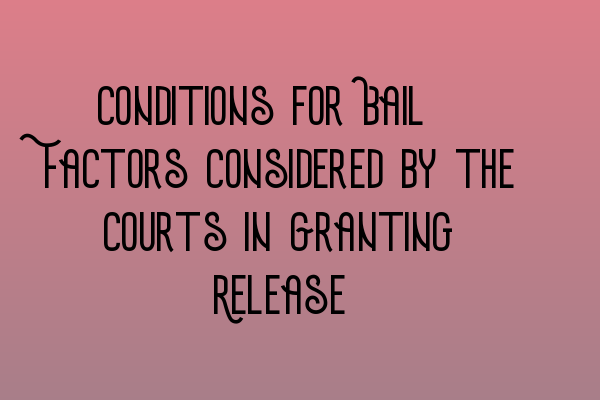Conditions for Bail: Factors Considered by the Courts in Granting Release
When an individual is accused of a crime, they may be detained in police custody until their trial. However, in many cases, the courts may grant bail, which allows the accused to be released from custody while awaiting trial. Bail is not granted automatically, and the courts take various factors into consideration before making a decision. In this article, we will explore the conditions for bail and the key factors that the courts consider when granting release.
1. Risk of Flight
One of the primary factors the courts consider is the risk of flight. The courts will assess whether the accused is likely to flee the jurisdiction to avoid prosecution. They will consider factors such as ties to the community, employment status, family obligations, and previous history of failing to appear in court. If the courts believe there is a high risk of flight, they are less likely to grant bail.
2. Severity of the Offense
The severity of the offense also plays a crucial role in determining whether bail will be granted. More serious crimes, such as violent offenses or offenses involving a high level of financial loss, may increase the risk of the accused committing further crimes or interfering with witnesses. In these cases, the courts may be less inclined to release the accused on bail.
3. Criminal Record
The individual’s criminal record is another significant factor. A history of previous convictions or a pattern of criminal behavior may indicate a higher risk of re-offending or interfering with the judicial process. The courts will carefully assess the individual’s criminal history, particularly any previous bail violations, when considering whether bail should be granted.
4. Community Safety
The courts have a duty to protect the community, and the safety of the public is an essential consideration. If the courts believe that releasing the accused on bail would pose a risk to the safety of others, they are unlikely to grant bail. Factors such as credible threats or evidence of ongoing criminal activity may lead to a denial of bail.
5. Personal Circumstances
The personal circumstances of the accused are also taken into account. The courts will consider factors such as the person’s age, health condition, and any dependents they may have. If the accused has a stable home environment and strong ties to the community, the courts may be more inclined to grant bail, especially if there are no concerns about flight risk or danger to the public.
It’s important to note that the above factors are not exhaustive, and the courts have discretion in considering additional relevant factors on a case-by-case basis. The decision to grant bail is ultimately based on the individual merits of each case and the principle of ensuring a fair and just trial.
